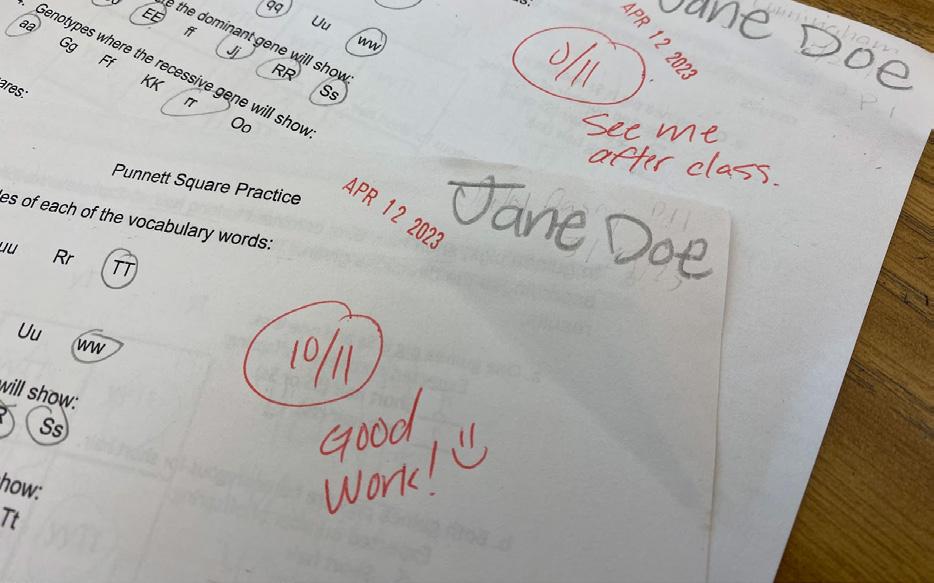










The Hawaii Police Department with officers from District One invited McKinley’s JROTC as well as other students and community members to rally together, at 7:00 a.m. on March 21, 2023. McKinley student Sara Yara (c/o 2024) died on Feb. 15 in a hit-and-run accident on her way to school crossing the Kamakee intersection after having the right of way. In attempts to spread awareness about dangerous driving, reckless speeding and promote road safety, participants held up signs for community support.
Road safety measures refer to the methods used to prevent drivers and pedestrians from being killed or seriously injured in road-related accidents. According to the Hawaii Injury Prevention Plan, traffic crashes are a significant source of injury with a 65% mortality rate. In addition, there were 117 recorded traffic-related deaths in Hawaii in 2022. While there have been plans to create safer roads in Hawaii, Yara’s death set those very plans in motion.
Sergeant Brandon Shiraishi, one of the leading officers of this event, said, “We are here today to bring awareness to traffic safety in the wake of what happened last month.” He also said some ways drivers could ensure safety on roads is by paying attention, following the laws and
speed limits and always being aware of both cars and pedestrians.
The loss of a McKinley student left others wanting to do more to promote safer roads and many came out to rally.
James Rodden (c/o 2023) who is an officer in the JROTC Battalion, said, “I’m here today to bring awareness to the situation of speeding and drivers not being aware of their surroundings and for community support.” In addition, Rodden said this experience was a wake-up call for drivers to be more aware that their actions have consequences and can ruin the lives of friends, family, students, an entire school and the entire state.
Another JROTC student, Sean Lester Sereno (c/o 2025), said he also attended the rally to help spread awareness. Sereno said some ideas he had to make school zones safer would be to add crossing guards in school areas, put more signs to warn drivers about children crossing the street and for pedestrians and drivers to always look both ways.
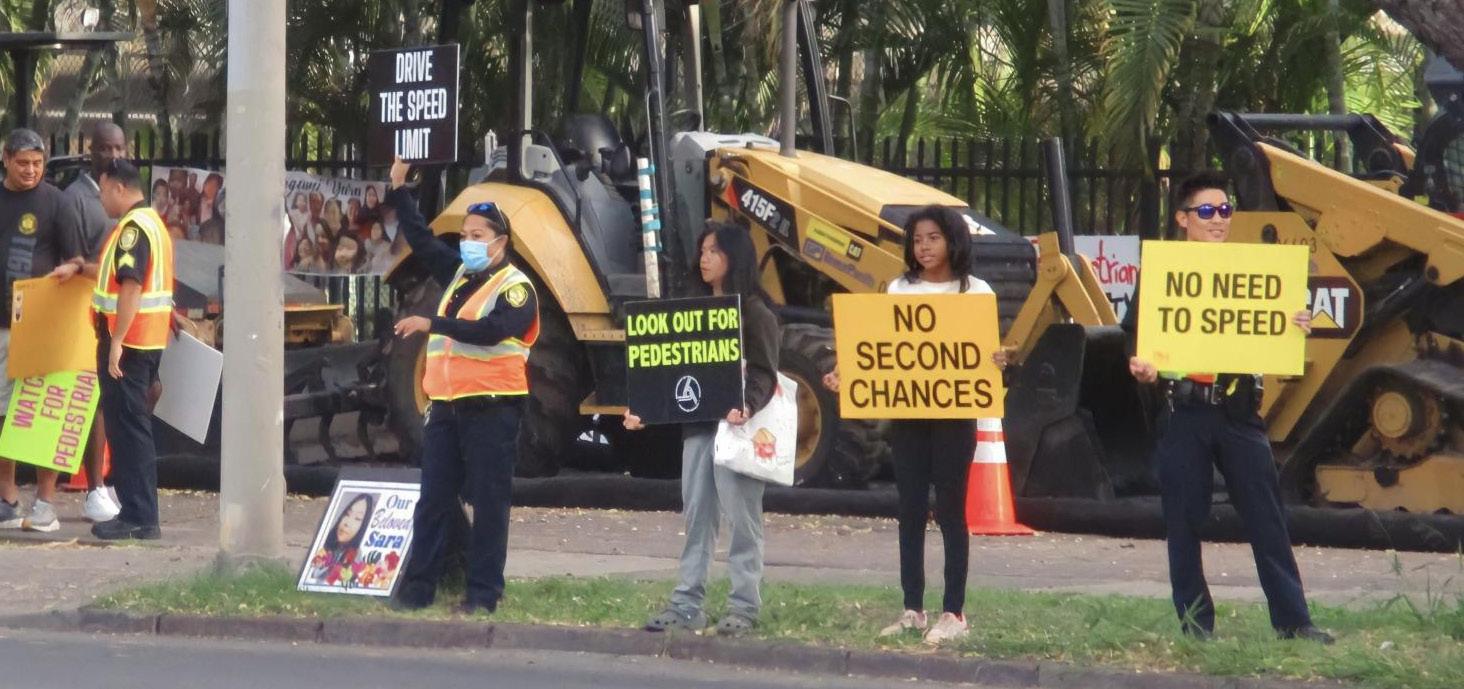
Lastly, Rianna Choniong (c/o 2023) said, “I came here with a friend, but I came to realize that I’m here to fight for pedestrian safety.” As a pedestrian, Choniong said she often feels rushed when she has the right of way when crossing the street and asks drivers to be patient and aware of their surroundings to prevent future accidents.
State Representative Scott Saiki,
who serves for McKinley’s district, informed the community through his newsletter of new traffic safety improvements created by working closely with the City and State Department of Transportation. Speed bumps were installed on the west side of Kapiolani Blvd and near the Kamake’e intersection, red light cameras, as well as designs for raised crosswalks on Pensacola St.
Since Yara’s death, there have been two pedestrian safety rallies, this being the second, both held at the place of the incident to encourage safety among drivers on roads. In February, a press conference at the McKinley football field was held to inform the public about new road safety implications and plans in addition to Scott Saiki’s informative newsletter to send to a wider range of people. Additionally, McKinley Principal Ron Okamura gathered students in the school’s auditorium soon after the crash to address the circumstances. This tragedy has deeply impacted the community but in turn, has started a chain reaction in fighting for road safety, especially for students going to school. And following the examples of Sergeant Shiraishi and District One officers to continue to spread awareness of pedestrian safety.
“It usually takes some sort of critical incident to become more aware of things that are going on,” said Sergeant Shiraishi.
Sara Megumi Yara was born on April 21, 2006. Many who knew Sara saw her as a compassionate person, always cheerful, and a bit clumsy. She enjoyed playing volleyball, golf and watching anime.

Gage Cisneros (c/o 2025) was Sara’s friend since middle school. One thing he remembers about her was that she would always look presentable at school.
“She would dress up when there is no event. She would just like to wear nice clothes to school just to look good, ” he said.
Sara’s twin sister Phoebe (c/o 2024) remembers when they tried to learn how to ride bikes in elementary school.
“She never learned how to ride a bike but she did enjoy watching me ride the
bike. … She didn’t want to do it, but we still went down the hill and still rode the bike,” Phoebe said.
Phoebe said if Sara was mad at someone, she wouldn’t hold a grudge for more than a day. She would always be in a happy mood even though she wasn’t feeling good.
Harley Lee (c/o 2024) said Sara was always there for her friends if they needed it.
“When I was feeling really bad, she was always there and she knew what to say,” Lee said.
Sara died in a hit and run accident.
To Phoebe, there are no words to put how much Sara meant to her. Sara physically being there and her presence is what meant the most to Phoebe.
 Infographic by Jade Bluestone.
Photo top left by Jade Bluestone District One officers as well as student Amara Auro and Danielle Cummings (both c/o 2026) holding signs at pedestrian rally. This page is shaded pink because it was Sara Yara's favorite color.
Infographic by Jade Bluestone.
Photo top left by Jade Bluestone District One officers as well as student Amara Auro and Danielle Cummings (both c/o 2026) holding signs at pedestrian rally. This page is shaded pink because it was Sara Yara's favorite color.
In McKinley High School, there are many clubs with many purposes, and the Love Club upholds their purpose of being a safe place to find support, advice, and new friends. The Love Club started in 2020, took a break during the pandemic years. It started when Jasmine Martin, a student at McKinley, asked English teacher Evon Le to manage the Love Club due to the fact that there wasn’t a club with this mission during the time.
Le said the purpose of the Love Club is to allow people who are a part of the LGBTQ+ community, and those who support it, to have a place to socialize and get to know each other better. She said that during typical club meetings they do ice breakers and discuss fundraisers and events. She said the club has also talked about serious topics regarding mental health, personal image, and the like. The way they decide the topic is through voting. She said that she accepted the role of adviser of Love Club because she has many friends who are in the LGBTQ+ community, and she herself has noticed that there wasn’t a safe place for McKinley students.
“The club is welcome for anyone to join. If you are curious you can just stop by to learn more,” Le said. “I want a safe space for these students to either talk to an adult or a fellow peer,” Le said.
Le emphasized on students to have someone to talk to about different problems.
“Be comforted knowing there are people like you and support you, “ Le said.
The name Love Club was chosen because the advisor wanted the club to be more social and less exclusive. Le wanted to avoid other students thinking that the club was only for a specific community. Le said the club was originally to be named the GSA Club, or the Genders and Sexualities Alliances Club. She said McKinley had a similar club before, though the problem was people immediately thought you were gay if you were in the club, even if the club was meant for those who supported the community too. Le said to counteract this, she and Martin, the student who founded it named it the Love Club to work around this situation.
Nickolas Castillo (c/o 2023) is the vice president of the Love Club. He said he joined the club because of him being in the LGBTQ+ community. Castillo said a typical club meeting talks about the events they would like to plan and other things the members would like to do. He said the Love Club is here if you need someone to talk to, and you can contact them is through their Instagram page,
which is @mhs.loveclub.
“It’s a safe place for other LGBTQ+ members to come to and be themselves,” Castillo said.
James Rodden (c/o 2023) is the honorary officer of the Love Club. The honorary officer acts like a second vice president in the Love Club. He said that he joined because of his friend, Castillo. Rodden said he wasn’t interested at first, but got to know the club better and changed his mind. He said he wanted to have more opportunities to be there for the members, so he became the honorary officer. He said the Love club is a safe space for anyone.
“Come to our club to feel safe and loved,” Rodden said. He said he pushes the club to be as inclusive as possible. He said he also strives to care for all the members. He said the club received some hate because others thought the club was just exclusive to the community they support, even though that isn’t the case.

“We are just here for you no matter what identity, race, or sexuality you are,” Rodden said.
Gage Cisneros (c/o 2025) is the president of the Love Club. He said the purpose of the Love Club is to encourage others to reach out and not stay hidden. He said the reason why he joined and became the president was because his friends were in it, and he wanted to meet new people. The last president recommended him to try out the role. He said the Love Club takes their time to learn about different communities and meet new people.
“There is always a safe place in the school. It’s your choice to pick where you want to be,” Cisneros said.
After living near McKinley High School for many years, Dianne Boons, a local neighborhood resident with a passion for writing, discovered the means to finally become involved with and contribute to the school community.
Boons is a former newspaper reporter who worked for The Daily Times-Call in Longmont, Colorado. She has written on a variety of topics, including mental health, for which she received a Mental Health Association award.
“People would stop me in the streets and thank me for helping them,” Boons said.
She later relocated to Hawaii in 1982 to help her brother with administration duties when he was establishing a law firm. But her involvement with the school started in 2022 when she learned that it had a band booster program. She said she loved playing in the band all throughout her childhood and wanted to be involved with it again.
“I’ve seen the McKinley band in parades. Their skill and showmanship are impressive,” Boons said. “I’ve always wanted to support them.”
Due to her explicit desire to be involved with the program, she was invited to attend one of the band booster’s meetings where she eventually became a member.
“I’m really glad supporting these young musicians in achieving their dreams,” Boons said.
During the meeting, a fellow booster member also suggested she join the School Community Council to participate in making key choices regarding school programs and policies alongside groups of parents, teachers, and community members.
“I’m really happy to be a part of it,” Boons said. “I think It’s a great way to
give back to the community and support the school.”
In addition to her contributions to the band booster program and SCC, she has also been volunteering every Tuesday working with The Pinion’s student journalists to provide them with feedback on their articles based on her experience as a journalist.

“The skills and lessons I’ve learned from my news-writing career has greatly impacted me in both community service and professional work,” Boons said. “Once a journalist, always a journalist.”
Boons says both student and professional reporters should be aware of the language their community uses to express themselves.
“Language isn’t necessarily English or Spanish. It’s what the people around you are speaking and writing,” Boons said. “Everywhere you go, every job, every university you go into has its own language.”
She said she wants to help young journalists in becoming influential writers in the future.
“I want them to be aware of that sociology so they can inform, inspire and illuminate the stories they write to other people.”
Boons said she has always wanted to be a part of the school community, to help and support the students in tangible means and ways.
“You’re supposed to help and support your local community, but I’ve never really figured out how until now,” Boons said.
She said many people in the public are unaware of the numerous events held at McKinley.
“When I became a band booster, I only then learned about the free concerts, the plays, and parades this school has,” Boons said.
Boons hopes to spend her time as a band booster, volunteer and a local resident in spreading opportunities for the community to be closer together.
“After 40 years in this neighborhood, I finally can support the school,” Boons said. “Many of us would love to help.”
Former newspaper reporter Dianne Boons provides feedback to The Pinion’s design editor, Jade Bluestone, about writing an article that engages with the audience. Photo by Cynthia Reves.“Toxic positivity is the assumption, either by one’s self or others, that despite a person’s emotional pain or difficult situation, they should only have a positive mindset or — my pet peeve term — ‘positive vibes,’” as explained by Dr. Jamie Zuckerman, a clinical psychologist in Pennsylvania. In a study by Science of People, 67.8% of respondents said they experienced toxic positivity from someone in the past week.

Toxic positivity sees negative emotions as ‘bad’ or ‘wrong.’ It pushes positivity and happiness onto someone, denying, minimizing, or invalidating authentic human feelings.
Positive thinking itself isn’t a harmful thing and can greatly help you, but over time and with the wrong kind of thinking it can become detrimental to your well-being. Such as masking your true feelings, not facing your problems, brushing them off, and feeling guilty for being sad, angry, or disappointed. Based on a 10-year Stanford study, it was found that denying negative feelings was linked to higher levels of depression. As Science of People put it, if you continue to deny your negative feelings it will continue to build up over time and become a bigger problem.
Daniella Jeanelle Bilango (c/o 2024) knows these feelings all too well. “When you open up to someone about these personal things, they’ll reply with others have it worse than you or you’ll get over it. It just makes me feel worse about the situation.”
She also knows people who favor
being happy rather than confronting how they genuinely feel. Bilango even had people break down before her, just trying to explain why. Why do they feel this way in their jumbled-up emotions? “Whenever I see them at school, they try to be happy and stay positive while I know they’re breaking inside,” she said.
In March 2023, I conducted a survey and was able to get 51 students to respond to it. Freshmen, sophomores, juniors, and seniors, were asked a se-
help.”
Students might not know the term ‘toxic positivity’, but they know what it feels like as 47.1% responded they know the term toxic positivity. I also asked how many times they experienced toxic positivity in the past week and more than half answered that they have at least once a week, with about 18% of those surveyed experiencing it more than three times a week. About 95% of responses from students also tend to ignore their feelings in favor of being happy even though they aren’t with reasons ranging from themselves, friends, family, social status, and more.
Lastly, I included a short written response for students to share their experiences with toxic positivity.
“Teachers saying to ‘Just be happy, it’s not as bad when I was in school”
“Just be happy. I don’t get why you have to be sad when you can be happy”
ries of questions relating to the topic of ‘Toxic Positivity.’ Even with a small amount of response, I was able to get a better understanding and grip on the topic.
The definition I provided was–Toxic Positivity happens when people believe that having any negative thoughts about anything should be avoided; that they should still be happy and positive even if it hurts. Such examples that can be considered toxic positivity under the circumstances are; “Stop being so negative,” “It could be worse,” “Just think on the bright side,” and “Smile, crying won’t
“I’ve been through worse”
“Why are you stressing out it’s not even that bad”
“At least you don’t have to worry about paying bills and food, you’re just a student and not even a good one, just average.”
Along with a short written response on personal tips they would give to people dealing with toxic positivity.
“Be true to yourself, let yourself be sad, feel emotions”
“Find other people to talk to that will make you feel better”
“Tune it out and understand that you can feel whatever emotion you’re
feeling at the moment. Understanding your emotions builds strong emotional intelligence which is better for you in the long term in understanding why you’re feeling a certain way”
“Have mental health days, take a break to do things you enjoy”
“Tell the person that emotions can’t change in an instant”
Toxic positivity is a real thing that happens in our day-to-day life, and it’s not something we can ignore. These students’ experiences are examples that it is real and not make-believe.
Remember, it’s okay to feel sad and not okay. Let yourself be vulnerable. Bottling it up will only make it worse for your mental health. Please remember that there are people out there that will listen to you and not make you push away your problems. Your mental health comes first above all, and understanding how you feel and what your body needs is one thing that can help you.
If you are still struggling or need someone to talk to, here are some resources.
Crisis Text Line: Text ‘ALOHA’ to 741741
Crisis Line: (Oahu) (808) 832-3100 (Neighbor Islands)
1-808-753-6879
National Suicide Prevention
Lifeline: 1-808-2730-TALK (8255
Self-Harm Hotline: 1-808-366-8288
If you wish to learn more about toxic positivity, these resources are linked online:
Toxic Positivity: Why Positive Vibes are Ruining You
The Rise Of Toxic Positivity, And What You Can Do About It
When Too Much of a Good Attitude Becomes Toxic | NEA
In a 2023 article, Chief Data Scientist & Head of Content at Research.com, Imed Bouchrika said normal stress rates for adults were 3.8 while teens rated their stress at a score of 5.8. There can be many different causes of stress such as school, work, family, or even the pandemic. When these issues are pushed aside or bottled up, it can lead to other problems in the future. Bouchrika also wrote, out of ten teens in the U.S., seven named anxiety and depression as a problem among peers in their community. With statistics clearly showing teens are facing stress, there are different coping methods that can suit one’s own personal feelings.
Qiu Qiao Liu (c/o 2026) said, “I’ve felt stressed when I had no one to talk to or when I was alone by myself. I’d feel really lonely and I just think of things I regret or I did bad.” She said she copes with stress by crying. She said that, after crying, she feels like the things that made her stressed weren’t as important as she originally thought.
Hanshan Zhou (c/o 2026) listens to music to help relax herself and relieve her stress.
She said, “When I have a bad grade and am under a lot of pressure, my family may notice and worry.” She added, “Listening to music is not the only way. There are many other ways I will use to reduce stress such as eating delicious food, going out for a walk to see the scenery, just doing everything that can make me feel happy.”
Stress was identified in sports, performance, and social functioning. While some may use sports
as a coping method, it also can be stressful depending on the person.
Perry Lam (c/o 2026) said, “As a tennis player, I have felt stress quite a lot, off court, in court, in a match, or even to my coach.” To cope, he said, “I ask someone older, wise, and knowledgeable about how I would cope with my stress.”
Students do not have to cope with stress alone. There are adults who can help, like parents, teachers and counselors. Art teacher Kristi Auyong said she feels many students have different struggles in life and it can be difficult for the students to handle alone.
She said, “I usually try to talk to them to see what’s bothering them and help find solutions to help them feel better.”
When they need extra help, she reaches out to their counselors or teachers to create a plan to give the student more help and support.
While teachers help students cope with stress, how did they cope with stress themselves as a student? Auyong said, “When I was a student, I used to let stress get to me because I didn’t know how to handle it, but what I found helpful was talking to a friend. Now, I work out, journal, and talk to loved ones whenever I feel stressed out.”
So the next time you are stressed, maybe one of these coping methods can help release your stress. Also know that you should never have to deal with stress alone. An article written by American Psychological Association said, “If you’re feeling stressed and don’t have anyone to rely on, psychologists can help. Also there are many other people who you could talk to like parents, relatives, friends, teachers, counselors, or any other trusted adults.

The year is ending, which means the seniors will soon cross the oval. The spotlight is on the class of 2023 as they finish another chapter in their stories. The majority of these experiences took place during the COVID-19 pandemic.
The class of 2023’s freshman year was the year COVID-19 hit. Their spring break was initially extended a week, which grew into their school year being cut short. Nyler Acasio, the class of 2023’s president, had concerns about the abrupt end to his freshman year and missing out on experiences.
“I was extremely hurt because I knew it was just the start of trouble since COVID was not going to disappear right away,” Acasio said. “I was looking forward to going out and doing stuff my sophomore year.”
McKinley is a school built on pride and tradition. Each freshman class goes into high school new to everything; the class of 2023 was no different. However, they only caught a glimpse of high school before it was cut short. Kiana Hung, the class of 2023’s vice president, was a part of the student council during COVID.
“It was a bummer but it was still memorable because I was still able to participate in some of the assemblies and traditions for the first time while it lasted,” Hung said.
For the school year 2020-21, McKinley started on an optional hybrid schedule for students. It al-
lowed students to come to school while staying socially distanced. The students who chose to come to school were separated alphabetically. The days were labeled as A, B, C, or D days, depending on students’ last names and grade levels.
Acasio was a hybrid student during his sophomore year. He said he felt being socially isolated and apart from his friends for most of the school day was lonely. At this time, he was the class vice president. He said the social isolation made it difficult for his class to stay in contact. Despite the restrictions COVID placed on the council, they didn’t stop communicating and creating interactive online activities for the class.
“There were only one or two people I could hang out with, but generally it felt pretty lonely,” Acasio said. “We were not going to let COVID stop us from being that leader.”
The student council along with Jodi Fong, the class of 2023’s adviser, didn’t let COVID put a damper on interacting and building a relationship within the entire class. The council worked hard to keep the same energy and enthusiasm that the class had before the switch to online school. Together they planned online game nights, movie nights, Kahoot and held an UNO tournament.
“We did a good job during distance learning. We tried to get game nights together and just get the class to be involved in stuff,” Fong said.
Fong said the senior class of 2023 has grown a lot since their freshman year at McKinley.
Hung said given the circumstances the council was put under at the time of distance learning, all of them pulled through and learned to be great leaders and people.
“I’m definitely a lot more outspoken and my public speaking skills have improved so much since my freshman year,” Hung said
Acasio has also joined many after school clubs this year such as Mock Trial, Future Farmers of America, Ignition, National Honor Society, and Chess Club. But during his freshman year he wasn’t involved in anything after school.
“I was the type of kid to hop on a bus as soon as the bell rang and just wanted to go home and do my own thing,” Acasio said. “But now I find myself staying after school quite a bit going to club meets and officer meetings.”
The class of 2023 is saying goodbye to McKinley High School and welcoming in the next stage of their lives. This class has been through the hardships of COVID and still pushed through to the end of high school together. All the seniors’ energy and excitement got derailed but they quickly picked it back up and came out stronger than ever, Fong said.
“If we didn’t have the pandemic, we would really be a force to be reckoned with,” Fong said.
Japanese Americans were discriminated against and not trusted when Pearl Harbor was attacked by Japan on Dec. 7, 1941. Although the soldiers of the 100th Infantry Battalion and the 442nd Regimental Combat Team were sent to Europe to fight for the United States, loyalty had to be proved with the risk of their lives.
On a Sunday afternoon, sitting in front of me was 99-year-old Dr. Takashi “Taka” Manago, who was a staff sergeant in the 100th/442nd RCT as a litter bearer, a soldier who transports casualties with stretchers from the front line to the medics.
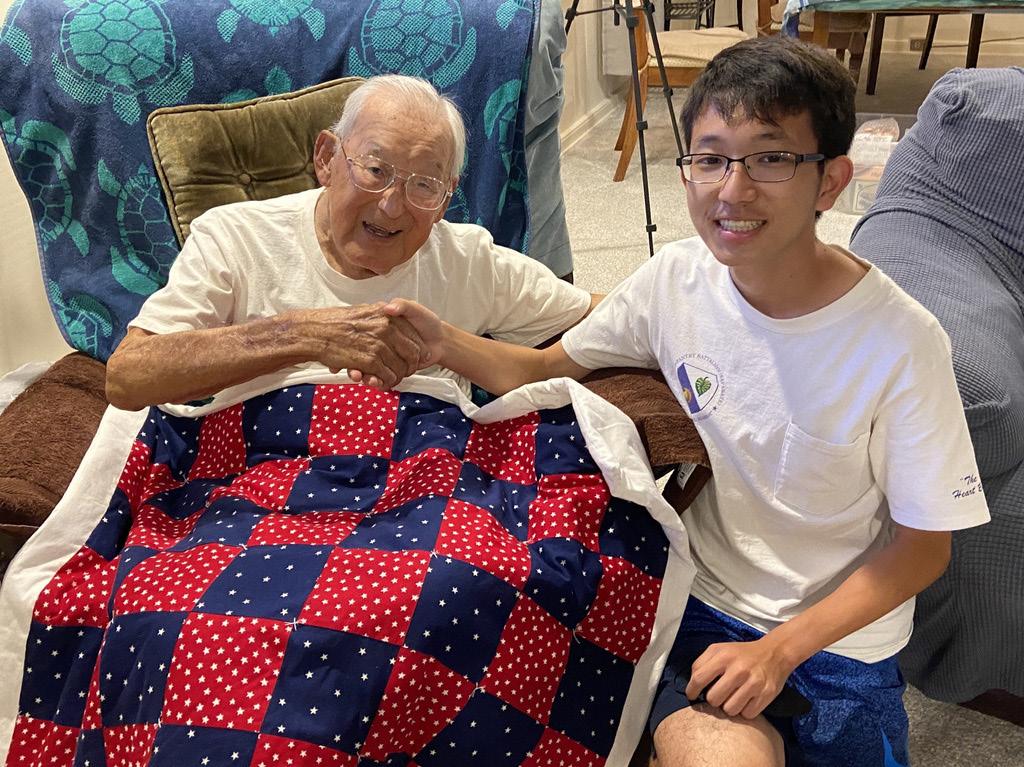
Stories were unveiled in his soft-spoken but spirited voice, describing his life and the opportunities presented to him.
Born Jan. 20, 1924 in Captain Cook, Hawaii, Manago was the fifth child to Kinzo and Osame Manago. Manago’s parents were the founders of the Manago Hotel in his hometown and is still open to this day, having 106 years of operation. On the day Pearl Harbor was bombed, Manago was 17 years old and a senior in Konawaena High School.
“I thought my father and the hotel would be confiscated,” Manago said.
However, Manago added, “My family, we were fortunate.” The hotel was closed to the public and housed military personnel during the war,
so they were able to keep the hotel running.
After graduating from high school in 1942 he attended University of Hawaii at Manoa for a year and a half until being drafted on Sept. 18, 1944, and sent to train at Camp Hood, Texas.
With a mischievous smile, Manago shared a story that, not intentionally, deceived his captain,
“My brother called my captain
For the next three weeks after being quarantined, Manago would served as a litter bearer during the historic mission to break through the German Gothic Line. In the dead of night, Manago and his partner searched for the casualties.
“My part of the war is to go to the front where the GI were hurt out there and come back,” Manago said. “Too dangerous to go during the day… The German was shooting at us, we got (shot at by) the Ak Ak (88mm gun).”
While on duty in Milan, he saw the Domm de Milan where he said it was untouched by the war. He also was given boxes that would have sweets, soap, cigarettes and chewing gum. There was a demand for it. Manago said he sold them for $10 each to the Italians. Manago whispered “Black Market.”
and said ‘This is Major Manago. My brothers are stationed at Camp Hood. Can you give my two brothers a pass (leave).” Following direct orders and without hesitation, captain gave his consent. “I had a nice time with my brother,” Manago said.
Upon returning, the captain asked Manago, “What branch is your brother in?”
Manago chuckled and responded, “He is not affiliated with any branch, that’s his given name, ‘Major Manago.”
After basic training, Manago and his brother traveled to New York then transferred to France by boat. Manago meeted up with the 442nd RCT and join the 100th Infantry Battalion, Able Chapter (A Company) in Marseille, France. As his company was on their way to Italy, someone on the boat contracted measles. They were quarantined at Leghorn (Livorno), France.
As the war ended, Manago went to Sweden where he learned how to ski and to take upon the opportunities to visit Italy’s atmosphere and beautiful buildings such as the Vatican church. Manago reenlisted another year in Italy because he knew this was an opportunity that is once in a lifetime to be in Europe.
“No one shooting at me, the war is over,” Manago said.
Manago pursued his education in general medicine from the University in Florence in Italy where he would meet his first wife, then returned home. In 1956, Manago earned his degree at Creighton University in Nebraska and continued on at Fairleigh Dickinson University Dental School.
As a veteran that served as a replacement for the 100th/442nd RCT and experienced combat for only three weeks, Manago said he felt he did not contribute to the war and his story as a soldier was irrelevant. However, the importance of his journey to broaden his experiences after the war in Europe and to take advantage of the educational opportunities to become a dentist is what stood out to me.
 Takashi "Taka" Manago with "Mascot" in Leghorn (Livorno), Italy. Photo from Manago Family.
Takashi "Taka" Manago with "Mascot" in Leghorn (Livorno), Italy. Photo from Manago Family.
National Library Week is on April 23-29 and celebrates the valuable role of libraries, librarians, and library workers in transforming lives and strengthening communities. One thing, though, that weakens the impact of libraries is book censorship. Book censorship is occurring on the mainland, like the ban on critical race theory books in Florida in 2019. In an article made by the American Library Association, there were 1,269 demands to censor library books and resources throughout the United States in 2022. Also 2571 unique books were targeted for censorship in the United States during the same year, with most of them being written by or about members of the LGBTQIA+ community, people of color. Some are even childhood and literary classics, like “The Giver” by Lois Lowry. Some teachers from Florida removed many of their books from their classroom library due to a law that requires only approved books be in the classroom, and not, yet, approved books have to go through an approval process.
In Hawaii, according to the State of Hawaii Board of Education, the Board of Education and the state librarian has responsibility over the selection policy, while decisions regarding the selection of books and other resources are the responsibility of the public service librarians of the state library system. In the website, the Library Bill of Rights states that books and other library resources should be provided for the interest, information, and enlightenment of all people of the community the library serves. Materials should not be excluded because of the origin, background, or views of those contributing to their creation. It also says libraries should challenge censorship in the fulfillment of their responsibility to
provide information and enlightenment.
Laura Nguyen (c/o 2024), vice president of the Book Club, said she has mostly noticed books pertaining to the LGBTQIA+ community and critical race theory are the ones being banned. Nguyen said she thinks right-wing states have a huge spike in censorship and bans on books mostly because the books don’t align with their conservative views.
Nguyen said censorship impacts people in a negative and not-so-obvious way. She said censorship is a way to restrict knowledge to the students and the public on how certain communities are, making them resort back to stereotypes. Nguyen said censorship erases the progress communities have made and reinforces old and outdated notions, such as women can’t be independent.
“If we are censoring women’s voices, we are also censoring their identities and the things they have done for the community,” Nguyen said.
The Book Club members listed topics they say shouldn’t be censored at all and should be exposed to all audiences.
“Censorship causes a lot of harm to oppressed communities,” the Book Club’s secretary, Daisy Wallace (c/o 2024), said. “Talk about history, inclusivity, LGBTQIA+, mental health, and sexual assault shouldn’t be censored.”
Nguyen said those who are curious about heavy topics should be able to learn about it.
Kimberly Maniquiz (c/o 2024), the Book Club secretary, said she is against censorship,
“It excludes things like inclusivity and history that should have been talked about,” Maniquiz said.
The Book Club officers agreed that librarians and teachers need to consider the age of the audience when

choosing books for students. Jennifer Danh (c/o 2024), Book Club president, said that situations like, perhaps, death and specific grotesque details of death should be kept hidden from younger audiences. “I can understand why some books are banned in schools with younger children, but as we get older we need more freedom in what we read,” Danh said. Danh said children still need to know the general premise of heavy topics and that it exists.
Sandy Domion, McKinley’s librarian, said censorship is on the rise, and is a form of control. She said she is grateful to other librarians who are aware of these things that are happening. Domion said she is against censorship, and that people should have the freedom to say what they want as long as they aren’t spreading falsehoods at the expense of others. She said people interpret things differently, and it is up to their own critical thinking to judge whether or not a book is appropriate for them.
“Just because students read books about violence doesn’t mean they grow up to become criminals,” Domion said.
Domion said there are books that have been adapted for younger audiences, books such as “Unbroken” by Laura Hillenbrand, and “Just Mercy’’ by Bryan Stevenson. Having books adapted makes it so that it would be more appropriate to all audiences, and make them aware of heavy topics. Domion said people should be able to know about things if they ask about it.
“The more you read, the more you know,” Domion said.
Arctic and create massive gas emissions that will cause irreversible damage for years to come,in Earth’s already fragile environmental state.
Researchers hypothesize that with this permission to drill at the site of Willow, the project would pump 287 million metric tons of climate pollution into the atmosphere.
But we can slow down the damage. Since the recent approval, millions of people have sent letters to President Biden and the Bureau of Land Management to share their opposition to the project. Those in opposition encourage others to write to the White House and to get in touch with local representatives working toward climate change. For Hawaii, this could include Senator Brian Schatz.
by Jade BluestoneOn March 13, President Joe Biden approved the Willow Project, an extensive oil-drilling project on Alaska’s Northern Slope. This project goes against Biden’s initial commitment to reduce carbon pollution by 2023. Environmentalists opposed it, saying it would increase carbon pollution. The news soon spread onto social media platforms, grabbing the attention of and outraging many young adults. This is no longer just Alaska’s problem, but a global one. Approving this project would lead to numerous, irreversible environmental damage.
The project had been in discussion for decades and was initially approved by the Trump administration but was reversed after a federal judge in Alaska pointed to the flawed environmental analysis, according to an article by Reuters. It wasn’t until 2018 when the development process took place that the project began its first
stages where members conducted extensive scientific studies as stated by ConocoPhillips that later raised concerns about how it could affect the environment. The project was revisited earlier this year by Biden who approved it.
One concern is how drilling can occur in Alaska where, due to global warming, the Alaska permafrost is and has been rapidly melting, leaving the Arctic melting four times faster than the rest of the world. In turn, this leaves fewer areas to allow for drilling and could cause the permafrost to melt even faster if done so anyway.
ConocoPhillips then proposed to attempt to re-freeze Alaska grounds using chilling technology to continue drilling for more oil. Environmentalists are concerned this process would speed up the melting.
While this project would increase economic growth and potentially enhance energy security, it would also threaten species living in the
For those concerned about the environment, opposing the Willow Project is not the only way to reduce carbon footprint. Invest in reusable products to lessen plastic pollution and buy locally to support community businesses instead of purchasing from mass-produced companies that focus on profit over environmental concerns. If you have the space, grow your own seeds, whether in a large garden or on your lanai. And lastly, throw away trash, even if it’s not yours.
One person can make a difference, but collectively we can make a bigger impact. By utilizing these methods in your everyday lives, your contributions can help put a stop to this project and be a call to action to help the environment.
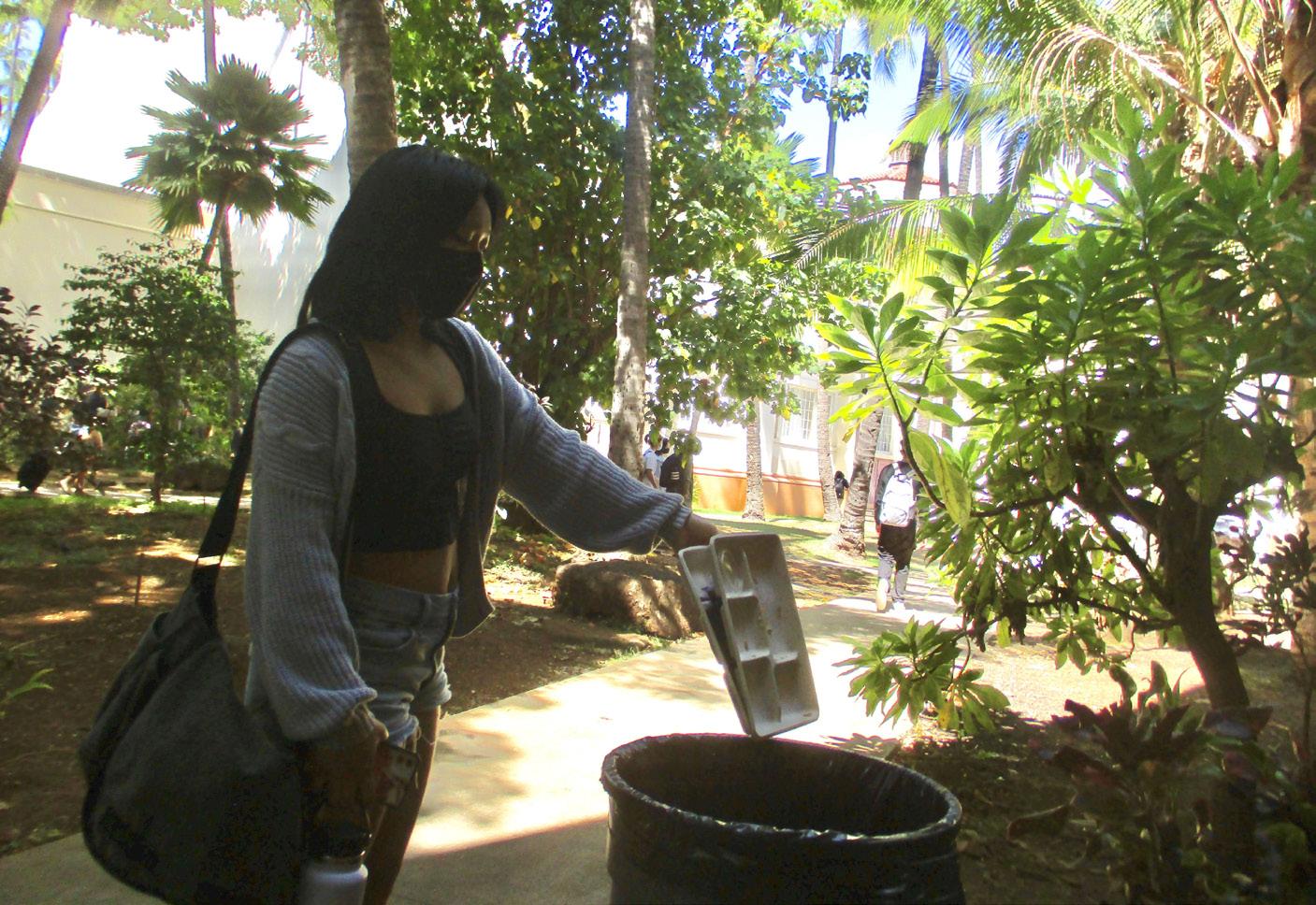
Find links to references on what you can do on the online version of this article at
Track and field are often thought of as just running, sprinting, and throwing. Although these events are involved in the sport, track, and field runs deeper. The individuality, teamwork, discipline, and endurance make this sport unique.
Track season started in early February, with the first qualifying meets at Roosevelt High School. The season consists of qualifying meets and invitationals. To qualify and progress to Eastern Divisions (McKinley’s division), individuals have to get the best time or personal record.


Christopher Martin, the head track team coach and senior English teacher, was a high school track star in Illinois.
“(Track and field) is a team sport, but it’s also individual. You’re on the track by yourself, but working for the team,” Martin said.
Martin stressed how improvement is based on time, not winning. This aspect of the sport improves one’s endurance.
“People shy away from running
track and field have helped her health and confidence.
“I joined track and field to stay fit for volleyball season and my health in general,” Perdido said. “(Track) has also helped how I interact with others in the same heat as me.”
Maleia Malone (c/o 2023) plays the role of a longjumper.
In the event of the long jump, the athlete has to sprint to an 8-inch wide board and jump as high as they can into a pit of sand.
because it sounds difficult, especially on a hot track. If you keep pushing yourself in any sport, including track, you’re going to improve,” Martin said.
Track and field have a variety of events including long distance, short distance, shot-put throwers, and long jump.
Autumn Perdido (c/o 2026) is a long-distance runner. Along with track, she plays volleyball. She said track has helped her in other sports and herself as an athlete, Perdido said.
“I think track and field have helped my endurance and confidence, even in volleyball,” Perdido said.
Perdido runs 800 meters, which is approximately half a mile, in her long-distance event. In this event, the runner has to do two laps around the track.
“We usually go between running and sprinting—once you reach the last 200 meters, you sprint. You just have to pace yourself,” Perdido said.
Perdido expressed her love for the support of her long-distance team members, saying they have been supportive and cheerful since the start of the season. Perdido said
Malone is one of the four seniors on the McKinley Track and Field team. Malone’s last meet was the Eastern Trials on April 7. She also ran the 200 and 400 meters.
“My last meet as a senior was sad. After I graduate, I won’t be running anymore,” Malone said. “All the meets and practices were very memorable.”
Malone joined track in her sophomore year. She said since then, her form and starter blocks have improved. Starter blocks are a device used in track and field meets to brace feet at the start of a race.
Along with self-improvement, she noticed the team’s improvements and problem areas.
“The track team has improved by helping each other out and working as a team in the relay races. However, they still need to work on not giving up so easily and complaining less,” Malone said.
Julian Ramirez (c/o 2024) plays the role of a shot-put thrower. Shot-put throwers are in charge of throwing a 16-pound ball off of their necks, aiming for 35-plus feet. To qualify, the goal is 45ft. His role as a thrower in
track and field helps him with his other sport, football.
“I believe it’s going to help me with my grip because I play offensive lines,” Ramirez said. “I block the other team to stop them from getting the quarterback.”
Ramirez’s experience with other sports allows him to see the uniqueness of track. In football, it is often seen as a team against team, Ramirez said.

“When you join track and field, it’s you against you out there. You have to have that confidence,” Ramirez said.
Joshua Dela Cruz (c/o 2025) is a short-distance runner. His main event is the 100-meter dash—that’s like running across 3.5 basketball courts. He said his event is the most
by Jerome LinearAs the bell rings and the lines form for lunch, the cafeteria staff go through a process that most schools in Hawaii do by preparing and serving school lunch to the students. McKinley’s lunch services are under the Hawaii Department of Education’s School Food Services Branch. The branch has been tasked with serving more than 100,000 nutritionally balanced, affordable meals a day to Hawaii’s students. This branch decides what’s on the menu, not the school.
McKinley’s school lunch manager Mark Miura said, “During COVID it was really hard to find supplies. Almost everything from paper goods to products were very hard to find. Oh, it was crazy.”
Various ingredients, such as a variety of different vegetables, fruits, and grains establish nutrients in the lunch that are shared through making school lunches.The cafeteria manager simply has to follow these standards, offering students fruits and vegetables every day.
competitive.
“Every millisecond difference counts in my event, from the moment the gun gets off, your reaction time and every second from then on,” Dela Cruz said.
The team has stressed the tension in the meets, but that does not stop the McKinley Track Team from building relationships with other teams.
“Everyone improved on themselves and friendship as a team—even with other schools, too,” Dela Cruz said.
Before McKinley, Coach Martin was Kaimuki High School’s track and field coach. Over spring break, Kaimuki and McKinley’s track team went over to Kaimuki High School to practice.
“It was different from our practice, but it was a good experience to see the differences in our schools’ training methods,” Dela Cruz said.
This experience has helped his improvement and endurance, Dela Cruz said.
“Practicing with Kaimuki helped me with my endurance. We ran a lot more total distance than what we normally do during practice in McKinley,” Dela Cruz said.
The track and field team has been putting in the effort to advance through the last strides of the season.
“Every meet just got better and better. Everyone improved on themselves, friendships, and as a team,” Dela Cruz said.
In McKinley there are mixed views about lunch. Some students simply eat lunch at the school and some don’t for their own reasons. Some say it is plain, but others say it’s cheap.
“It’s only occasionally good because sometimes the food is low quality but when they have rice and anything with chicken or pork they get it right,” Omar Miller-Seals (c/o 2025) said.
This is completely normal, however, as you would have students who are completely fine with school lunch being the way it is considering it’s free for those who are qualified for the free and reduced lunch program. However, you would also have students who wouldn’t eat school lunch because they have their own lunch or they dislike school lunch.
“School lunch is alright because it’s free and fills you up,” Kirby Alik (c/o of 2026) said.
Still, school lunch is made to meet the nutritional needs of growing teens. Students eating regular, healthy meals is critical to student health and wellbeing, especially for low-income students.
Some students feel school lunches are a way to rejuvenate energy for their next periods.
“It gets me by honestly. I would be drained from classes and tired going into the lunch period. School lunch really sets me back to 100%,” DJ Maluyo (c/o 2023) said.







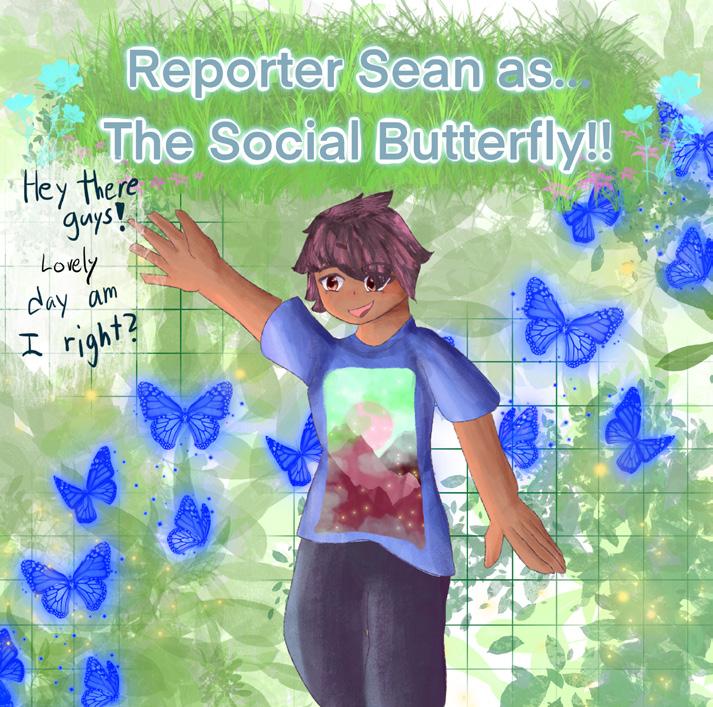




"Hello Tigers, out of my three years of being in Newswriting, this has been our first semi-normal year. This year's staff has been a fun one and I'm sad to see them go. I look forward to serving The Pinion for my last and final year next year. BANZAI!" Shane Kaneshiro, editor-in-chief.

An Vo (c/o 2023) won second place in the Hawaii Journalist of the Year competition.


54th Hawaii High School
Journalism Awards 2023
Most Valuable Staffer - Jade Bluestone
Writing Division 3rd in State
Best Nonfiction Storytelling -3rd place
Shane Kaneshiro
"In my first and only year in The Pinion, I've gained invaluable lessons that can be used anywhere. Thank you for allowing me the space to write what matters to me, and hopefully to others as well." Jade Bluestone, assistant editor.
- Coach Kale Awakens the Tigers
Best Opinion - 4th place
Cheska Orias
- It Still Hurts
Best Investigative Reporting - 4th place
Shane Kaneshiro
- Restoration of Hawaiian Place Names Rejected
Best Breaking News - 5th place
Jade Bluestone
- McKinley Theater Prepares For Return
"Being in the school paper has been a wonderful experience. It gave me many memories and lessons to look back to as I reminisce." Sean Willem Giron, assistant editor.


Best Illustration - 1st place
Cheska Orias
- It Still Hurts
Best Multimedia Presentation - 2nd place
Chloe Cunningham and Jacky Oasay
- McKinley Tigers Hit The Gym
Best Portrait Photograph - 3rd place
Shane Kaneshiro
- Coach Kale
Contest Poster - 3rd place
Cheska Orias
"Writing for The Pinion has been an enlightening experience, introducing me to dedicated individuals such as our adviser, Cynthia Reves. Her skillful mentoring and passion as a teacher has deepened my understanding of both the journalism profession and the English language." Dominic Niyo, assistant editor.
- Free the Press

Best Action/Candid Photo - 5th place
Shane Kaneshiro
- Freshmen Orientation Ski Race
Established in 1920
Editor-in-Chief
Shane Kaneshiro
Assistant Editors
Jade Bluestone
Sean Willem A. Giron
Dominic Niyo
Chloe Cunningham
Aubryanna Hale
Jerome Linear
Jacky Oasay
Cheska Orias
Juliana Rodden
Tiffany Tran Adviser


Cynthia Reves
Mission
The Pinion staff strives to provide and maintain accurate, entertaining and informative news for the students, staff and alumni of McKinley High School. We strive to show diligence in creating all our content so we can make a positive contribution to the public.
The Pinion is published by the Newswriting class and printed by Reprographics Learning Center.


The Pinion McKinley High School 1039 South King Street Honolulu, HI 96814
All content and more is at mhspinion.com. Print archives are at issuu.com/mhspinion.
Questions or Comments? Interested in donating or advertising? Email - 10002427@k12.hi.us
